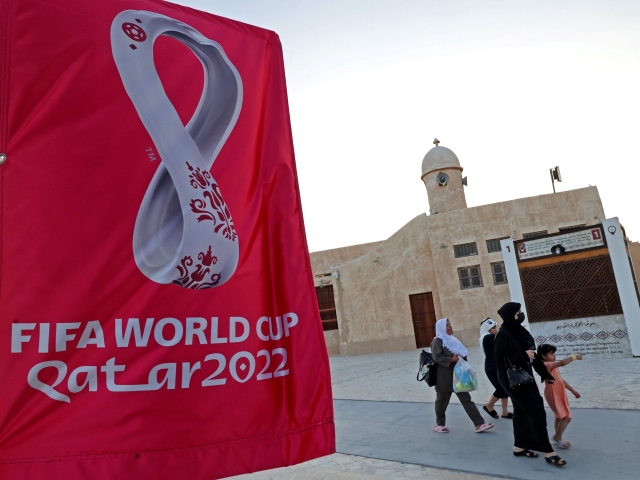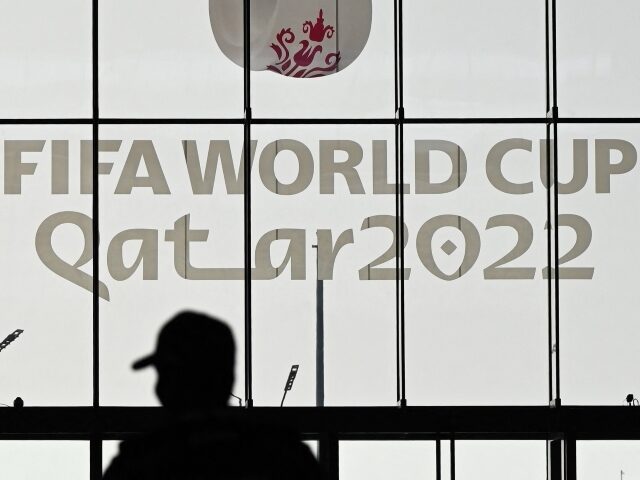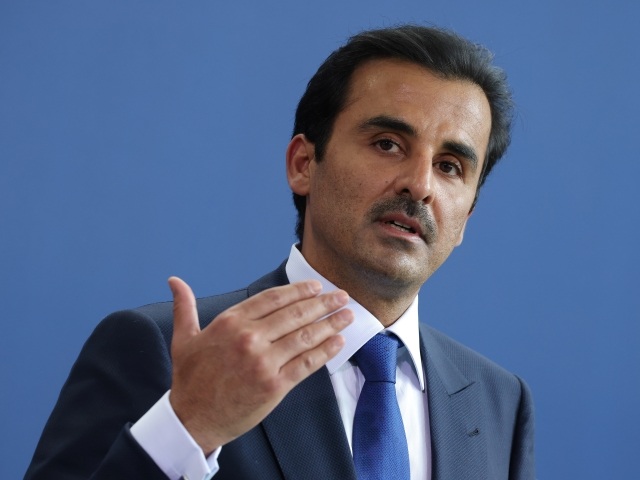A gay man identified only as “Ali” told the British newspaper i that a dating attempt in Qatar, set to host this month’s FIFA World Cup, ended with police officers gang-raping and ultimately deporting him.
Ali, a Filipino man who had traveled to Qatar for work, said that he had made plans to meet a Turkish man who claimed to also be gay at a hotel and found six police officers in the room. Speaking to i, he acknowledged that identifying as LGBT or any activity associated with being gay is illegal in the country but questioned why police felt the need to rape and torture him prior to his arrest.
Both FIFA and the Qatari government are facing a global wave of condemnation for allowing the small authoritarian Islamist regime to host the tournament, one of the world’s most prestigious sporting events. The controversy began as soon as FIFA announced Qatar would host, as the desert nation’s weather is so dry and hot that asking athletes to play during the summer months the World Cup usually occurs in would present a severe health risk. Qatari officials and FIFA responded to those concerns by moving the tournament into November – the temperature in Doha, the nation’s capital, is expected to range in the upper 80s and lower 90s Fahrenheit this week. The tournament is set to begin on November 20.

People walk past FIFA World Cup banners at a beach in Doha on November 3, 2022, ahead of the Qatar 2022 FIFA World Cup football tournament. (Photo by Giuseppe CACACE / AFP) (Photo by GIUSEPPE CACACE/AFP via Getty Images)
Qatar has also faced an outcry from human rights activists over its abuse of foreign workers used to build stadiums and other facilities for the tournament. Under the nation’s kafala system, employers control nearly every aspect of the life of a foreign worker and often use that power to force them to work onerous hours and withhold pay. Qatar has responded to criticism of what many activists describe as a slavery system by enacting mass arrests of protesting workers and deporting those who do not conform or attempt to attract attention to the issue.
Officials in Qatar have increased complaints in the last month that the nation has faced “unfair” condemnation for its atrocious human rights record and signals to world soccer fans that they will not be exempt from the abuses locals are accustomed to if they attend the World Cup. FIFA has insisted, disregarding human rights activists, that the Qatar World Cup will be “a celebration of diversity” and in June, considered LGBT pride month, claimed the event will be open to all “regardless of race, ethnicity, religion, age, disability, sex characteristics, sexual orientation, gender identity and expression.”
The i report focused specifically on abuses against LGBT people in the country, both Qataris and foreigners. Qatar legally prohibits homosexuality and all extramarital sexual activity, as well as severely repressing women under a sharia legal structure.
Ali’s story indicated that repression of suspected gay people went far beyond fines or jail sentences for those violating rules of public behavior into routine entrapment operations meant to humiliate and torture LGBT people.
Ali said that he decided to use a gay dating mobile phone application while in Qatar and a man identifying as a Turkish national messaged him and suggested meeting. He offered Ali 300 Qatari rials, or about $82, if Ali agreed to wear a dress in his hotel room.
“When I saw the hotel, I entered inside. It was the tenth floor. … I opened the door, and I went inside. There are six people,” he narrated, all of whom were police officers.
“They catch me and threw me on the bed. They started to rape me. … All of them except the Turkish [man] – he watched until they finished. He was laughing at me,” Ali recalled. “When they finished, they opened my bag and checked all my things, looking for proof, saying, ‘This is prostitute, this is gay’. So they had evidence.”
Qatari officials then swiftly deported Ali.
Dr. Nasser Mohamed, an LGBT rights advocate that i described as the only “publicly out gay Qatari in the world,” explained that the men who gang-raped Ali were likely part of Qatar’s “Preventive Security Department,” an agency separate from the policy that acts as an “unhinged mafia that go [around] arresting people.”
“They go undercover, they pull people from public places, just on the suspicion of them being gay,” he explained, often targeting visibly gender non-conforming people, such as men who have long hair or wear makeup.
FIFA responded to the report with a statement to i similar to its pride month declaration, insisting that Qatari officials knew they could not treat World Cup spectators will the same brutality they treat migrant workers or their own people.
“Qatar as a host country is fully aware of its responsibility to adhere to FIFA’s expectations and requirements on human rights, equality and non-discrimination,” the statement read.
In October, the Qatari government published a long list of rules for World Cup spectators that appeared to indicate FIFA’s promise of leniency towards soccer fans would not be met. Among the demands Doha is making of World Cup tourists is for all to download mobile phone spyware to allow the government to track all their data. Data experts responded to that announcement by suggesting anyone traveling to the World Cup simply not bring a mobile phone.
FIFA has done little in response to years of reports of harrowing, and deadly, abuse of foreign workers. Qatar has faced years of protests from workers who say that employers simply refuse to pay their salaries and the government offers them little recourse as foreign nationals. In August, Qatar rounded up 60 foreign workers protesting for their pay and arrested them for allegedly “breaching public safely laws” with peaceful protest. An estimated 30,000 foreign workers were used to build World Cup facilities, often working in repressive desert heat for inhumane hours and little — and sometimes no — pay.
Investigations into abusive employers, years of reports have documented, rarely result in any meaningful action.
Sheikh Tamim bin Hamad al-Thani, the emir of Qatar, complained last week of the global disgust with Qatar’s human rights record in anticipation of the sporting event.
“Since we won the honor of hosting the World Cup, Qatar has been subjected to an unprecedented campaign that no host country has ever faced,” Sheikh Tamim said, accusing human rights activists of “fabrications and double standards that were so ferocious that it has unfortunately prompted many people to question the real reasons and motives behind the campaign.”
On Thursday, Minister of Foreign Affairs Sheikh Mohammed bin Abdulrahman Al Thani told the French newspaper Le Monde that human rights concerns were “attacks … by a very small number of people” that were merely “unfortunate.”
“The reality is that the world is looking forward to this celebration. Over 97 percent of the tickets have been sold. Among the 10 countries that bought the most tickets, we find European countries like France,” Al Thani asserted.
Al Thani appeared to blame bigotry for the outrage: “I think there are some people who don’t accept that a small country in the Middle East is hosting such a global event.”


COMMENTS
Please let us know if you're having issues with commenting.